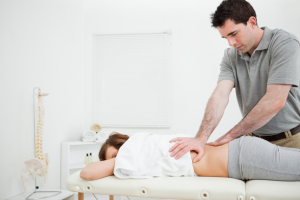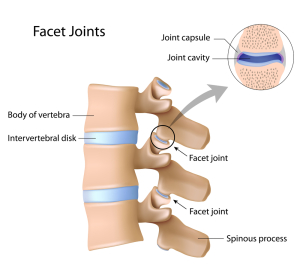Here I am dealing with a muscle strain of the lower back and lower back strain treatment suggestions. In the beginning the back pain associated with a muscle strain of the back can be considerable and the associated inability to engage in most daily activities of life is quite incapacitating.
In this initial phase passive treatment modalities such as physiotherapy and chiropractic treatments are very useful to regain a great deal of the range of motion and achieve pain control within a few days or weeks.
Acupuncture treatment is also useful for this purpose. Subsequently the patient needs to start active exercises to prevent muscle atrophy. Patients develop chronic back pain as a result of not going to this second step of rebuilding muscle strength. There is a group of patients who have lower back pain on a recurrent basis because they have developed muscle weakness (due to muscle atrophy) and the weakened muscles tend to get into muscle spasm, which causes more back pain.Apart from inactivity with increasing age come multiple hormone deficiencies that will also interfere with muscle strength. In males a lack of testosterone, a lack of thyroid hormones and a lack of growth hormone can contribute to weak muscles. In females a lack of estrogen/progesterone, a lack of the normally low level of testosterone, a lack of thyroid hormones and a lack of growth hormone can all contribute to muscle weakness. In both sexes the adrenal gland hormone DHEA is also needed for muscle strength (Ref. 13).
Along with this comes perhaps a higher likelihood of straining the facet joints, which are not protected by the weakened back muscles. We have learnt a lot from sports medicine, where a lower back strain in athletes rarely lasts more than a few days or up to 2 or 3 weeks. Deconditioned people often take up to 12 weeks for the same injury to recover from. The “splinting” effect of well trained back muscles will prevent future back strains and injuries.
References
1. ABC of rheumatology, second edition, edited by Michael L. Snaith , M.D., BMJ Books, 1999.
2. The Merck Manual, 7th edition, by M. H. Beers et al., Whitehouse Station, N.J., 1999. Chapter 52.
3. The Merck Manual, 7th edition, by M. H. Beers et al., Whitehouse Station, N.J., 1999. Chapter 275,p.2429.
4. HA King Orthop Clin North Am 1988 Apr;19(2):247-255.
5. HA King Orthop Clin North Am 1999 Jul;30(3):467-474, ix.
6. The Merck Manual, 7th edition, by M. H. Beers et al., Whitehouse Station, N.J., 1999. Chapter 59.
7. JA Smith Orthop Clin North Am Jul 1999; 30(3): 487-499.
8. The Merck Manual, 7th edition, by M. H. Beers et al., Whitehouse Station, N.J., 1999. Chapter 56, p. 469.
9. Wheeless’ Textbook of Orthopaedics: http://www.wheelessonline.com/ortho/arthritis
10. Goldman: Cecil Textbook of Medicine, 21st ed.(©2000)W.B.Saunders
11. Ferri: Ferri’s Clinical Advisor: Instant Diagnosis and Treatment, 2004 ed., Copyright © 2004 Mosby, Inc.
12. Rakel: Conn’s Current Therapy 2004, 56th ed., Copyright © 2004 Elsevier
13. Thierry Hertoghe, M.D.: “The Hormone Solution – Stay Younger Longer With Natural Hormone And Nutrition Therapies.” Three Rivers Press, New York Copyright © 2002








